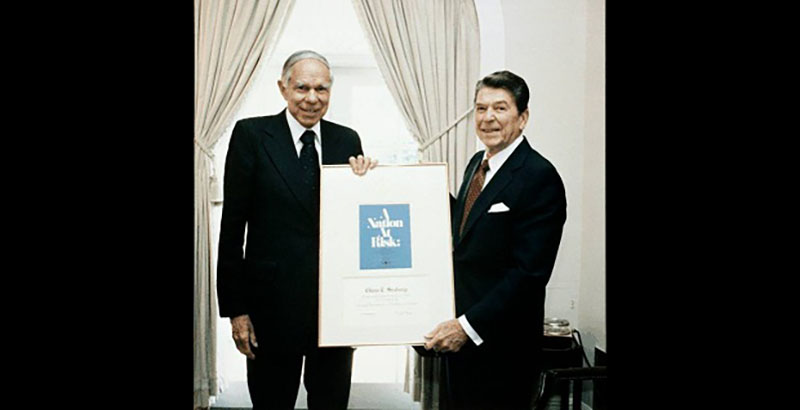35 Years After Release of ‘A Nation at Risk,’ Reagan Institute to Hold Education Summit Surveying a Generation of Change

In April, “A Nation at Risk” turns 35, and the Ronald Reagan Presidential Foundation and Institute is using the anniversary as a chance to discuss the state of American education in light of one of the school reform movement’s seminal reports.
The institute is planning an inaugural bipartisan Summit on Education in Washington, D.C., on April 11 and 12 to discuss what’s been learned (and what hasn’t) since the report’s release, from the role of states in education to the Every Student Succeeds Act.
The honorary steering committee convening the conference is chaired by Sen. Lamar Alexander, head of the Senate Committee on Health, Education, Labor and Pensions and former secretary of education.
The committee reads like a Who’s Who of major players in the world of K-12 education: former Florida governor Jeb Bush, Rep. Virginia Foxx, Sen. Patty Murray, Rep. Bobby Scott, and former education secretaries Arne Duncan, John B. King, Margaret Spellings, and Richard Riley. Former legislators John Kline, George Miller, and Howard P. McKeon, and Reagan Foundation and Institute trustees Frederick J. Ryan Jr., Michael P. Castine, and Ben C. Sutton are also committee members.
The members of the committee will participate in the conference, said Janet Tran, director of learning and leadership at the Reagan Institute, but she also expects that they will continue the conversations beyond the event, forming an “unlikely coalition” with a common goal.
“What we were hopeful to achieve with the honorary steering committee is to bring together folks who are luminaries in the education space,” she said. Although the Institute has yet to iron out a specific agenda, the steering committee’s members “have certainly committed to providing a speaking role or a supporting role and also using their platform to bring folks to the table as well.”
The 1983 report by the National Commission on Excellence in Education famously said that the United States education system was failing so badly that “If an unfriendly foreign power had attempted to impose on America the mediocre educational performance that exists today, we might well have viewed it as an act of war.” The authors decried the “rising tide of mediocrity” they observed in public schools, indicated by falling SAT scores and low rankings on international assessments.
Thirty-five years later, many of the concerns that fueled “A Nation at Risk” sound familiar: robots taking over jobs, America’s declining global competitiveness, and the need to make sure every child receives an excellent education.
Three members of the steering committee are the immediate previous secretaries of the U.S. Department of Education: King, Duncan, and Spellings. The event will conclude with a panel of former education secretaries — likely those from the committee, although Tran said they may serve on other panels, as they are “experts in their own right” — to discuss their experiences and the lessons they learned while leading the department.
“There was not a sugarcoating; it was not politically correct,” Duncan said of the report at the time of its 30th anniversary. “The fact that they talked about the good, the bad, and the ugly, I think, is so important.”
“A Nation at Risk” sparked new interest in raising standards, improving curricula, and increasing academic accountability. However, some described the report as “sensational” and oversimplified, a complaint that has been repeated many times in the past three decades.
Alexander said the report may have done “more than all the federal legislation that we’ve passed” to spark meaningful school reform.
Get stories like these delivered straight to your inbox. Sign up for The 74 Newsletter

;)
